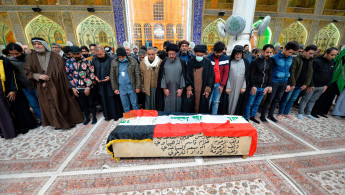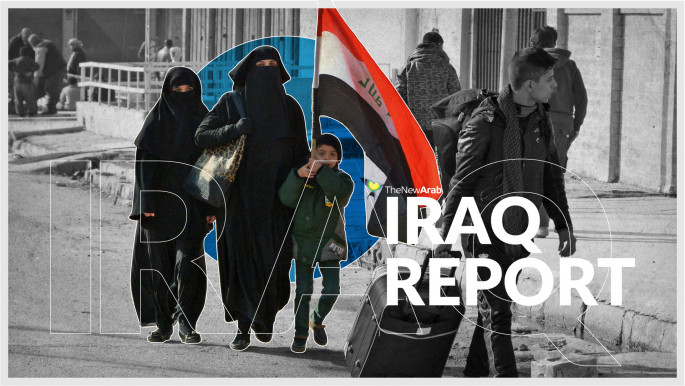The Iraq Report: Deadly terror in Baghdad suicide bombings
While there is obvious fury at the militant group, Iraqis have also expressed dissatisfaction with the security forces and pro-Iran militias, whom they blame for Iraq's endemic insecurity that allows such attacks to continue despite IS' formal defeat in late 2017.
Meanwhile, Turkey is bolstering its military presence in Iraq by engaging in high-level diplomatic overtures with both the federal authorities in Baghdad and the autonomous Kurdistan Regional Government in Erbil.
By courting both authorities, Ankara is seeking to tighten the noose around the proscribed Kurdistan Workers' Party (PKK) that has irked both local Kurds and the central government by taking over various territories in Iraq using armed force.
With a tripartite agreement seemingly forming, including with local Kurdish factions, the PKK may find itself pushed to the brink as its traditional hideouts are exposed to Turkey's military might.
IS strikes in deadly Baghdad attacks
The Islamic State group has claimed responsibility for a dual suicide bomb attack at a crowded market in central Baghdad on Thursday. In the deadliest IS attack in Baghdad since 2018, the first suicide bomber drew in crowds of people who were shopping in the Bab al-Sharqi area by falling on the floor and pretending to be unwell. As people approached to help the seemingly sick man, he detonated his explosive vest.
 |
There is widespread public outrage at what Iraqis deem to be a total failure of the authorities to protect civilians |  |
When onlookers rushed to the aid of the wounded hurt in the first blast, a second attacker then approached on a motorbike and detonated his explosives in the middle of the crowd, killing and wounding dozens more.
A tweet by the Iraqi defence ministry spokesman, Yehia Rasool, appeared to indicate that the attackers were being pursued by security forces before they conducted their attack.
This has led to public criticism of the police and intelligence agencies for failing to stop the attack, and Rasool announced a reshuffling of the Iraqi security apparatus in response on Friday, sacking the interior ministry official responsible for domestic intelligence. The attack comes as Iraqis prepare for an election, and electoral events in Iraq are often preceded by bombings, assassinations, and other violence.
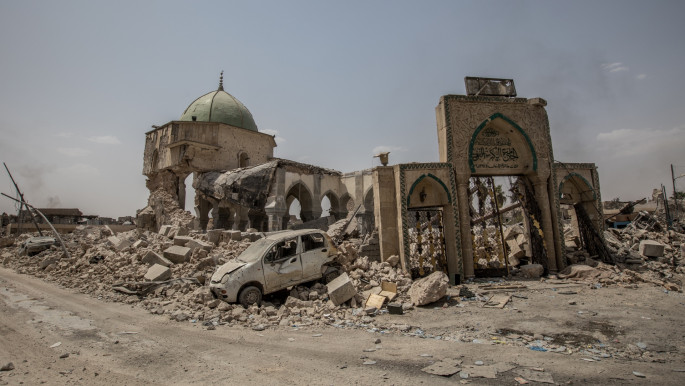 |
|
| Read more: Mosul: A wounded city trying to heal |
In 2018, an attack took place in the same Bab al-Sharqi area just a few months before Iraq's last round of parliamentary elections that was boycotted by most of the population, having a voter turnout of only 44.5 percent.
Prime Minister Mustafa al-Kadhimi had originally set this year's general election for June, nearly a year ahead of schedule, in response to widespread protests in 2019. However, the government is poised to reschedule them for October to give electoral authorities more time to register voters and new parties.
But there is widespread public outrage at what Iraqis deem to be a total failure of the authorities to protect civilians.
"This isn't about our democracy," Ahmed Shakir, an eyewitness to the suicide bombings, told The New Arab. "These attacks show that the government cannot protect us because it has let militias be in charge of security rather than patriotic Iraqis who are loyal only to Iraq."
Iraq's federal police force, intelligence agencies, and various military units recruit heavily from sectarian Iran-backed Shia militias who are often loyal to specific politicians or parties. This is particularly the case with the Popular Mobilisation Forces (PMF), an umbrella organisation of Shia paramilitaries that is officially part of the Iraqi armed forces but takes orders from Iran's Islamic Revolutionary Guard Corps (IRGC).
 |
The government and the security institutions are riddled with men loyal to parties who are loyal to foreign powers |  |
"The government and the security institutions are riddled with men loyal to parties who are loyal to foreign powers," Shakir said. "It is no wonder that these attacks happen whenever there is an election. Look at those who are supposed to protect us."
This sentiment was echoed by activists who were part of the 2019 protest movement. One of them, speaking to The New Arab on condition of anonymity due to threats to their life, said that the attack vindicated the protest movement.
"When we demonstrated against these traitors who sold our country, we were killed and accused of spreading sedition," the activist said. "But look at what happened yesterday. Aren't we justified in saying that state corruption has led to insecurity and no economic activity?"
Although former Prime Minister Haidar al-Abadi declared IS defeated in 2017, the militant group has been active in desert and mountainous areas ever since.
While Baghdad has been spared any major bombings since 2018, IS fighters have actively bombed several population centres around the country, mainly in the north and west. The strike at the heart of Iraq's capital is likely to erode public confidence in the authorities even further.
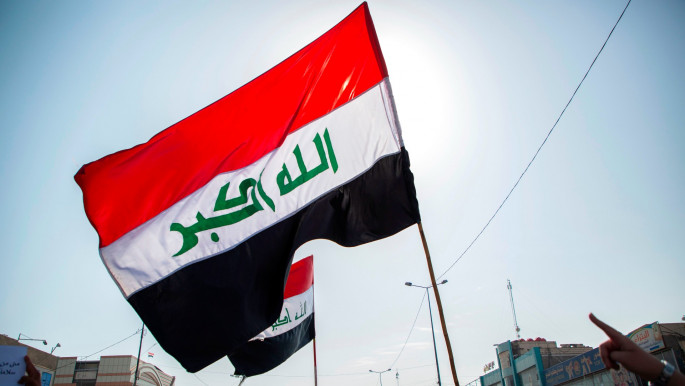 |
|
| Read more: The Iraq Report: Kurd-on-Kurd violence as protesters clash with police |
Turkey engages Iraq's top politicians to fight PKK
Turkey has ramped up its diplomatic charm offensive in Baghdad and Erbil, attempting to woo both the federal government and the autonomous Kurdistan Regional Government (KRG) in Ankara's fight against the outlawed PKK.
On Monday, Turkish Defence Minister Hulusi Akar travelled to Iraq accompanied by Chief of General Staff Yasar Guler and held a marathon of talks with nine high-ranking Iraqi officials in just 36 hours.
Amongst others, Akar met with President Barham Saleh, Prime Minister Mustafa al-Kadhimi, Defence Minister Juma Anad, and Interior Minister Othman al-Ghanimi in Baghdad. Following their meeting, Kadhimi stressed that Iraq would not accept any terror attacks to be conducted against Turkey from Iraqi soil.
Akar also held separate talks with powerful Kurdish politicians in Erbil, including former KRG President Masoud Barzani, his successor and relative Nechirvan Barzani, and KRG Prime Minister Masrour Barzani.
Following the talks, the Turkish state-backed newspaper Daily Sabah reported that Akar had pledged Turkey's "help" to clear Iraq's northern Sinjar region of PKK elements.
 |
Turkey has ramped up its diplomatic charm offensive in Baghdad and Erbil, attempting to woo both the federal government and the autonomous KRG in Ankara's fight against the outlawed PKK |  |
Since ousting IS from the region more than four years ago, the PKK has moved into the area by taking advantage of the vacuum left by IS' demise and the central government's weakness. This has obviously posed security concerns for Turkey who have conducted airstrikes there and last summer launched Operation Claw-Tiger to root out PKK hideouts in the Kurdistan Region's mountains.
The continued presence of the PKK in northern Iraq is now being perceived as a common security threat leading to this unprecedented trilateral cooperation between Baghdad, Erbil, and Ankara. Relations between the two countries are now increasingly being considered in terms of regional defence and security.
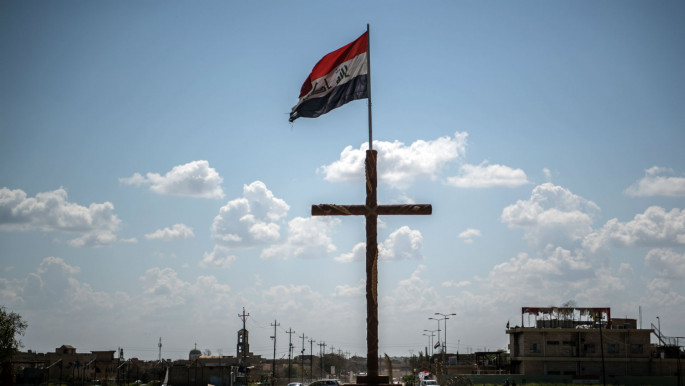 |
|
| Read more: Iraqi Christians face an uphill battle for survival |
A previous edition of The Iraq Report discussed the intensifying conflict between the KRG and the PKK that has led to a rash of Kurd-on-Kurd violence. Although the PKK had long found safe harbour in Iraqi Kurdistan, the PKK's tactics of strongarming local Kurdish populations whilst undermining the authority of the Erbil government has led to direct confrontation.
This has led to continuing violence between the two which has encouraged Iraqi Kurds, who also long-harboured separatist ambitious, to forge an unlikely alliance with both Ankara and Baghdad to root out and destroy the PKK.
For the PKK, its long-term position in northern Iraq can seemingly only be salvaged by cutting a deal with Erbil. While the Barzani faction is bent on their destruction, the PKK could leverage the Patriotic Union of Kurdistan (PUK) led by the Talabani clan, rivals of the Barzanis, to ease pressure on their bases.
However, this seems unlikely, particularly given the tripartite agreement and the PUK's relative isolation on the matter. The PUK is close to Iran, which itself has problems with an offshoot of the PKK that has agitated Iran's domestic Kurdish population into several secessionist rebellions.
Short of coming to terms with Erbil, the PKK are now facing an existential crisis in northern Iraq. Should they lose their hold on the Qandil Mountains, they will have significant problems continuing to prosecute their war against Turkey in the long-term.
The Iraq Report is a regular feature at The New Arab.
Click below to see the full archive
